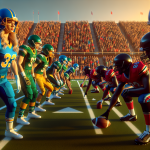In the world of American football, star players like Kelce find themselves not only in the intense spotlight of sports journalism but also under the scrutiny of entertainment media. Kelce’s relationship with the famous singer Taylor Swift has only intensified this media attention, with journalists eager to get a glimpse into their personal lives.
The NFL has long allowed post-game interviews to take place in locker rooms, where reporters can get immediate reactions from players. However, concerns have arisen about the invasion of players’ privacy and their ability to focus on their professional duties amid a constant barrage of personal questions.
Now, there are talks within the league about potentially moving these interviews to designated areas outside the locker room. This proposed shift aims to strike a balance between providing players with a private space to decompress after games and catering to the needs of the media in covering the sport.
The NFL Players Association (NFLPA) has been a strong proponent of this change, emphasizing the importance of keeping the locker room as a sanctuary for athletes. The NFLPA recently formally requested a reevaluation of the league’s media access policies to better align with players’ needs for privacy and recovery time.
The push for this policy change is not just about Kelce and Swift but also reflects a larger trend of athletes facing increased scrutiny from non-sports media outlets. The merging of sports and entertainment journalism has led to more personal questioning and a focus on off-field matters rather than on-field performance.
Sources close to the situation have hinted at the potential changes to come, with interviews likely to be conducted in separate, designated areas outside the locker room. The league’s move is seen as a way to protect players’ privacy, especially those like Kelce who are in high-profile relationships with celebrities like Swift.
As the new rules take effect, players can find solace in knowing that their post-game downtime won’t be making headlines as much. The league’s decision to implement these changes now may seem coincidental to some, but it ultimately aims to balance the needs of players for privacy with the demands of the media in today’s sports and entertainment landscape.





